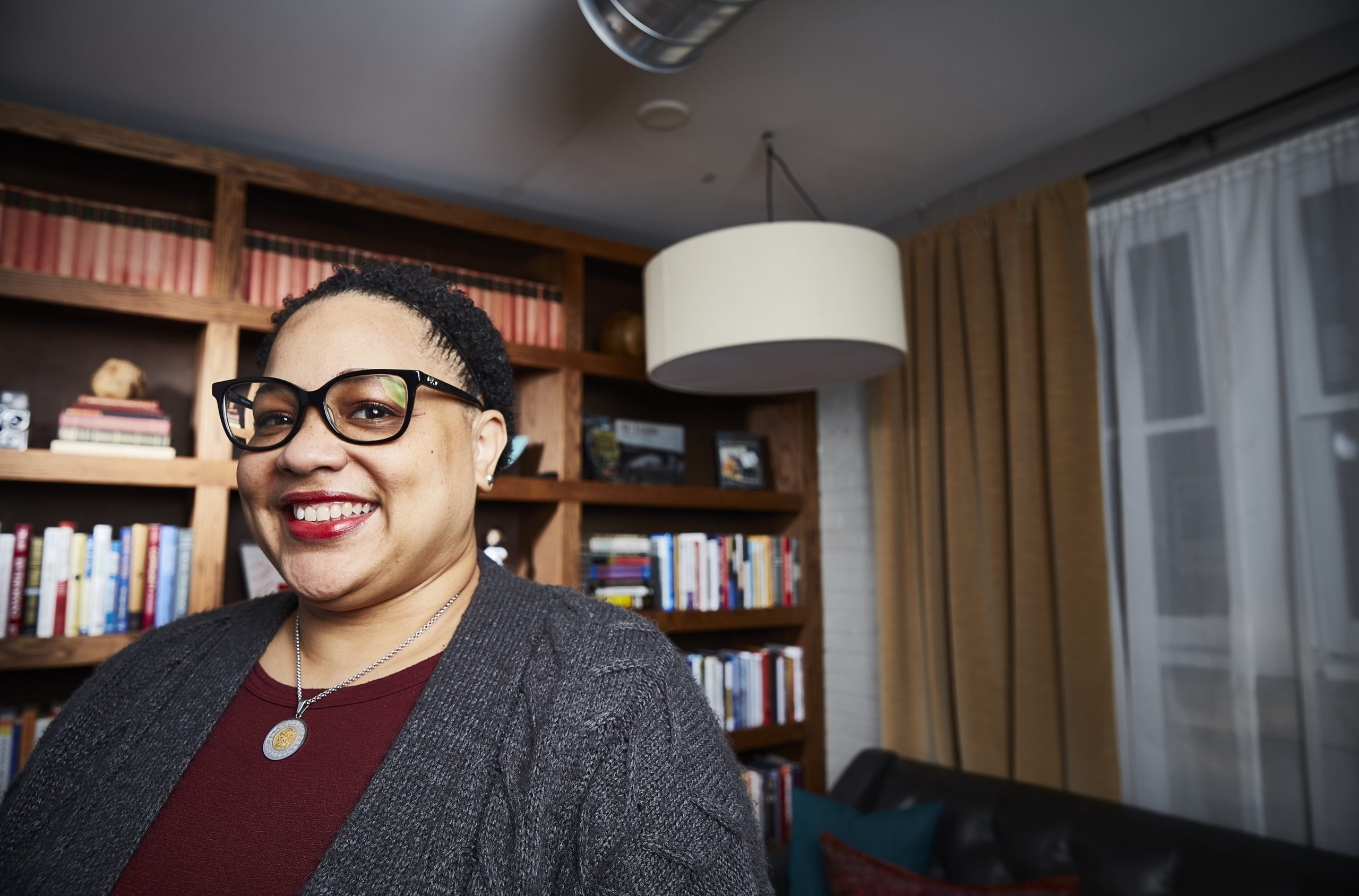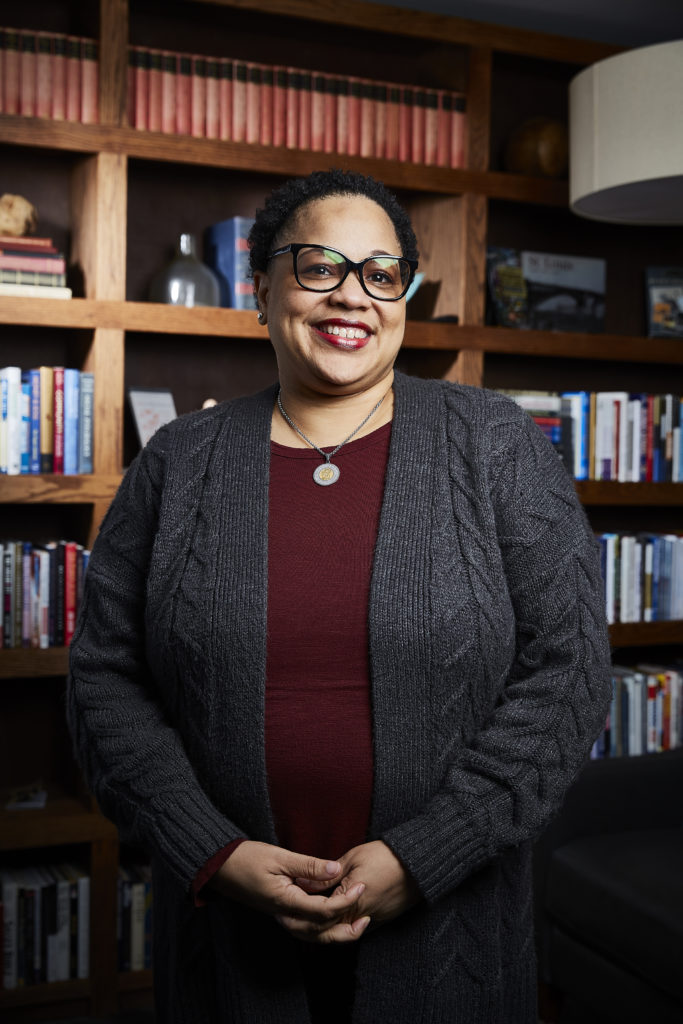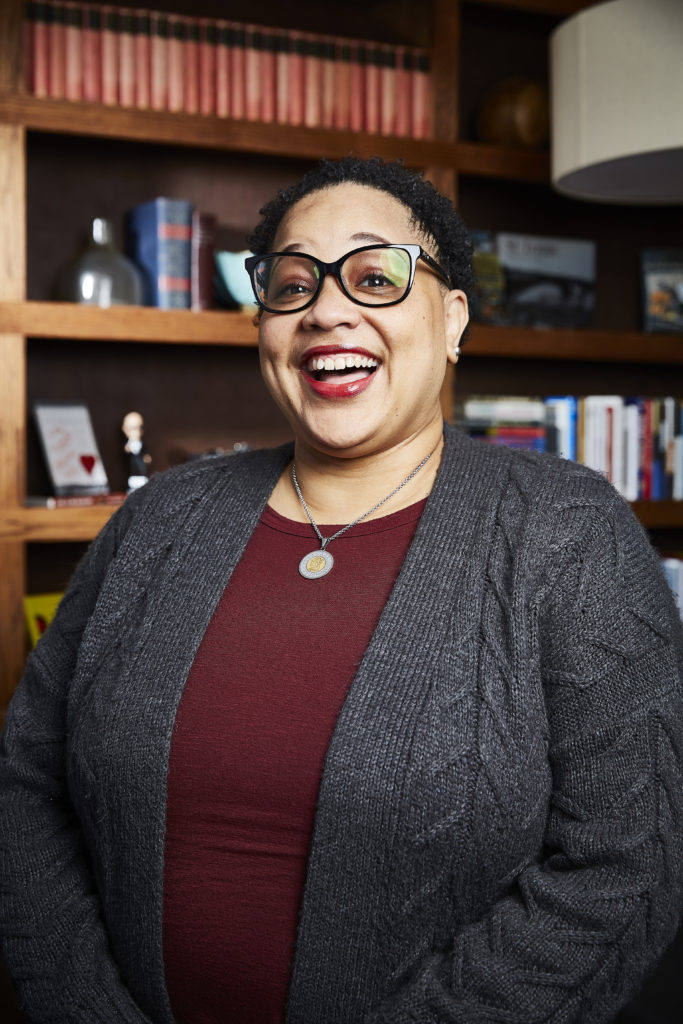Justice Is My Favorite Word
FEBRUARY 26, 2021
Justice Is My Favorite Word
by Councilwoman and Inaugural Chisholm’s Chair Fellow Nicole Greer with Joey Saunders

Justice is my favorite word, but I want it to be more. I want to see it leap from the pages of books, protest signs and my dreams for the future until justice is the air we breathe. Like air, I want justice to be so essential and commonplace that it could easily be taken for granted. Only we will not take for granted those who came before us. We will honor those who fought to ease our breathing. We will think of them in the new world we’ve built and inhale sweet, fragrant justice. That’s the scent of the future I strive to build as an elected official.
I’ve come a long way from the scent of my past, when my nose was filled with the scent of conformity, like hairspray sizzling against hot metal as I straightened my kinks. My past didn’t always smell that way. I remember it smelling like freshly mowed summer grass, Kansas City Barbecue, and the oddly comforting mustiness of the paper grocery bags my mom let my little brother and me carry as we walked home from the A&P Grocer. They were the carefree scents of the first nine years of my life when I had no idea yet how I lived “East-of-Troost,” a phrase, especially on White lips, that was shorthand, like “North-of-Delmar” is in St. Louis, for “the bad part of town.” So, I was surprised when my mom told me my school wasn’t good. She worked relentlessly to find subsidized housing in the Grandview district where we moved so I could get a better education.
Even more surprising was how much less money and more melanin I had than my new classmates. I went from being in a class full of Black kids with just one White girl to being the only Black girl just before middle school. My mom had such a strong, “say it loud, I’m Black and I’m proud,” Malcolm X vibe that she instilled in us at such an early age. So, like a typical pre-teen and on through my teenage years, I remember feeling uncomfortable being Black in this new environment while being ashamed of that discomfort in my own home. I never talked to my Black-power-preaching mom about any of it. I became a code-switching expert, leading to a lot of comments from my classmates’ lawyer and doctor parents about how “articulate” I was.
I became friendly with one of my many White classmates, a girl who was lower-income too. When the Scholastic Book Fair came to our school, we stole Sweet Valley High books and secretly applied lip gloss to try and keep up with the cool girls. But nothing reeked, literally or figuratively, of desperation quite so much as the burning odor that came with trying to fry my hair bone straight by dragging my mom’s curling iron through it.
I finally started marching to the beat of my own drum, literally, when I discovered the geeky embrace of marching band. I became a drum major. I lost a lot of weight, gained some wacky friends, and had a ball. Then high school graduation came and I went straight into the workforce.
That was my youth in a nutshell. I’d love to say I was some local political savant or that I swiped Angela Davis’s autobiography and not Sweet Valley High, but it wouldn’t be the truth. I was blissfully unaware, then adrift, then a band geek. Whiffs of politics in my early memories are faint. I vaguely remember my family celebrating when Jimmy Carter was elected President. And, I remember us struggling more with aid being cut during the Reagan years, my mom was vocal about that.
I do remember, somewhat more vividly, when I was quite young, my grandma took us about a block from where she lived, to Prospect (an avenue infamous for supposedly being lined with liquor stores, drug deals, and prostitutes) and 42nd. There were all these people there. Our U.S. Congressman, a Black man named Alan Wheat, came down the street, I waited, he came and shook my hand as he walked by. I remember not really knowing what was going on, but that it seemed kind of cool of him to do that. I got the impression from my grandma that sort of thing didn’t happen very often.
 Aside from that, I have no memories of Black politicians growing up. I wouldn’t even learn who Shirley Chisholm was until well into my adult life.
Aside from that, I have no memories of Black politicians growing up. I wouldn’t even learn who Shirley Chisholm was until well into my adult life.
As a young adult, I was focused on my daughter, Sydni, and building the most financially secure life I could for us. A job opportunity brought us to St. Louis, Missouri in the early 2000s. I found myself settling, for a time, in Kirkwood where I felt good about the schools for Sydni while being aware we were in a predominantly White area.
Like many mothers, I wonder if I did enough to prepare her for that situation or if I could have protected her more or pushed for better school policies. I was anxious at the time because I didn’t want to become “The Difficult Mom” and put a kind of target on my daughter’s back. My daughter, she’s 23 now, recently reminded me of an exception: she once came home upset that her gym teacher told her and other students to, “quit acting like little monkeys!” I stormed up to the school to give that teacher a piece of my mind. I started talking with my daughter more about political topics and these conversations often became about race, then I noticed a trend in how the conversation would double back on itself as we traced frustrating incidents at her school or on the news back to unjust policies steeped in systemic racism.
Talking with my daughter about race and constantly coming back to how woven-in, often intentionally, racism is to the fabric of American government and institutions at every level, can be so exhausting, so heartbreaking. It can make you feel so powerless as a Black mother raising a Black daughter. They felt like important conversations to have, but I needed to see hope. I needed to see a path forward toward justice. And, as these conversations broadened beyond mother and daughter to become national conversations, I saw that path emerge.
The aching need to inhale sweet justice after Mike Brown was murdered was, and continues to be, a catalyst for so many of us, compounded infinitely by George Floyd, Breonna Taylor, and the many, many others for whom we ache, for whom we fight. As recently as this summer, the local conversation sounded like an echo. Many were furious when St. Louis County Prosecuting Attorney Wesley Bell decided not to pursue charges of murder or manslaughter against the former police officer who killed Brown. Some even felt betrayed considering the way Bell campaigned as a strong, Black advocate for progressive criminal justice reform. But, to me, it’s a variation on an all too familiar theme. To me, Bell isn’t the problem. The problem is the cobwebbed system of laws and policies that bind us, that were designed to keep knees on our throats and protect our oppressors and killers, especially if they have the impenetrable shield of a police badge.
Realizing this, my primary concern was with protecting my daughter within systems that weren’t designed to protect her. Over the last few years, that shifted, as I grew to understand power and how it can be wielded to build justice where once there was none.
I was driving to the bank with my daughter one evening in 2015, but we never made it. We’d just moved from Kirkwood to Creve Coeur and I saw the overpass, at 270 and Olive, filled with people, mostly White folks, holding Black Lives Matter signs. I wondered who these people were and went to check it out. They were having a vigil, they told me, and belonged to a group called West County Action Network (WE CAN). They invited us to join them for a meeting afterward to talk about racial disparities in school discipline practices and what could be done about it. I was suspicious, but my curiosity was piqued.
I met them at Bread Co. where they were going over all these staggering statistics. The percentage of Black students in Kirkwood schools, where my daughter had gone since she was in second grade, was tiny, yet they made up the majority of out-of-school suspensions. Crunching the numbers, it seemed miraculous that my daughter had never gotten a suspension. My stomach churned thinking about how important not making too much noise had been to me. I decided it was time to change that.
I joined WE CAN, started learning about the District’s discipline policies and who made them. Until then, school boards and local government had barely been on my radar. Quickly, I became immersed in community organizing and political advocacy. Our youth, Black youth, were getting a bad rap. The school-to-prison pipeline came into focus for me. A preacher once corrected me and said, “no, womb-to-prison pipeline,” referring to the lack of resources and health disparities Black mothers face. I was telling anyone I could about what I learned and recruited folks to join the cause. My passion was noticed. I was encouraged to run and was elected as one of WE CAN’s co-chairs. But it still seemed like there was only so much we could do from outside of the system. I felt like I needed to learn more about and from the insiders.
Jennifer Lohman, who directs the St. Louis Area Voter Protection Coalition, was one of a handful of folks who encouraged me to get more involved with Missouri’s Democratic Party. I’d been good at energizing folks around issues, like school discipline reform and ending felony convictions for minors, I figured I might be good at recruiting folks to run for office. I found myself at a candidate’s training seminar where a woman named Michelle Hornish asked the group, “By a show of hands, who plans to run for office?” She made me put my hand up. I told her, “The public servant part, I’m down with, but I am not a politician.” But it was precisely my willingness to serve that made people push me so hard to run.
One of those people was my fellow WE CAN organizer, Jake Lyonfields, who I lovingly refer to as “nephew” (he calls me “Aunt Nicole”) because, even though we aren’t related, there’s a familial bond that forms when you organize for racial justice together. When we were texting about the political tumult of County Executive Stenger resigning, Dr. Sam Page replacing him, and the vacancy it left in my county district, Jake messaged me, “please, please, please, Aunt Nicole!” County council seemed like a pretty big leap. I was thinking smaller, like the Chairperson for Creve Coeur's Democratic Committee. Jake was persistent and got my daughter in on it too, so then she started egging me on, “Do it, mom!”
But you have to play all these insider games. Jake did a lot of digging to figure out what the process would be to be nominated since the information wasn’t incredibly accessible. He had me call the Democratic Committeewoman who eventually let me know when the nomination meeting would be held. Once I got to the meeting, I was frustrated to see that the room was almost all White folks aside from me. My County Council district covers Chesterfield, Creve Coeur, part of Hazelwood, Overland, Bridgeton, all the way up to Airport. I did not feel that the Committee reflected the racial makeup of these communities. Even though it ruffled some feathers, I voiced this concern.
Soon after, I received a call from City Councilwoman Heather Silverman, who knew me from organizing and voter rights work. She suggested I run for Creve Coeur City Council. I called the incumbent, he encouraged me to run and said he wouldn’t stand in my way. I thought, for sure after all the noise I made someone will see this Black woman file and run against me. But, I ran unopposed. Now, I’m the City Councilwoman for Ward 2 of Creve Coeur.
Initially, it was disorienting, I wasn’t used to being a public official. I was used to being an organizer calling for public officials to advance racial justice. Now, I’m getting my bearings and trying to navigate wielding the little slice of power I have and actually put my money where my mouth is. I’m the one fielding calls and emails from community members now, not the one doing the calling and emailing. And so much of it isn’t cut-and-dry. Who knew people could be so passionate about whether or not QuikTrip gets permits to erect a gas station in a neighborhood?
My play-nephew Jake had been part of this astounding region-wide movement for racially equitable early childhood education launched by WEPOWER’s Tomorrow Builder’s Fellowship. I learned that WEPOWER had another initiative in the works called Chisholm’s Chair, named after Shirley Chisholm, the first Black woman elected to Congress and the first woman to run to be the Democratic nominee for President. Chisholm’s Chair is for Black and Latinx women exploring or in public leadership. I applied and was admitted to the first cohort. The program just wrapped this month. It’s been a valuable experience to come together with other like-minded women navigating something that doesn’t really come with instructions.

Chisholm’s Chair gave me access to an executive coach, a policy professional who has been extremely helpful with translating my vision and lived experiences into an actionable platform. There have been plenty of technical lessons, but the most valuable thing I’ve come to learn is that I have so much more power than I thought I did. It has been an immense confidence booster. Especially knowing I have this built-in support system I can call on when I need it.
That support system is so important when you step into the political arena. If ever I feel discouraged by how much everything is driven by money or who-knows-who, it’s great knowing you have folks that have your back. Equally affirming is having a role model who looks like me, something I don’t really remember having growing up. My coach hooked me on Stacey Abrams’s book, Our Time is Now. I could cry thinking about how I feel her gubernatorial election was stolen from her but how she turned that around so sweet. She’s such a badass boss.
I’ve learned to be inspired, not just by her, but by myself and the potential of people like me to rail against injustice. The people who’ve seen it up close. People like my family who would have been casualties of economic inequity had my mom not scrapped and clawed and found subsidized housing in a decent school district. People like me, who had to unlearn White supremacist values that kept me meek for far too long. Well, I am owning my power now and I am taking my daughter with me as we recruit more folks like us to fill vacant seats, to run against status-quo incumbents and to demand justice. Sweet justice.
Now, justice isn’t throwing someone away because they made a mistake. People ask me, “Well what if someone close to you was the victim of this or that crime?” Three of my cousins have been murdered. One, on my mom’s side, was killed by his own brother. But that is still my aunt’s son. He’s still my cousin. Something was going on, unresolved trauma or mental health issues, and he didn’t get what he needed. Locking people up isn’t what I mean by justice. It is more compassion than vengeance. It’s getting people what they need.
Yes, justice is my favorite word, because I’ve written my own definition.
